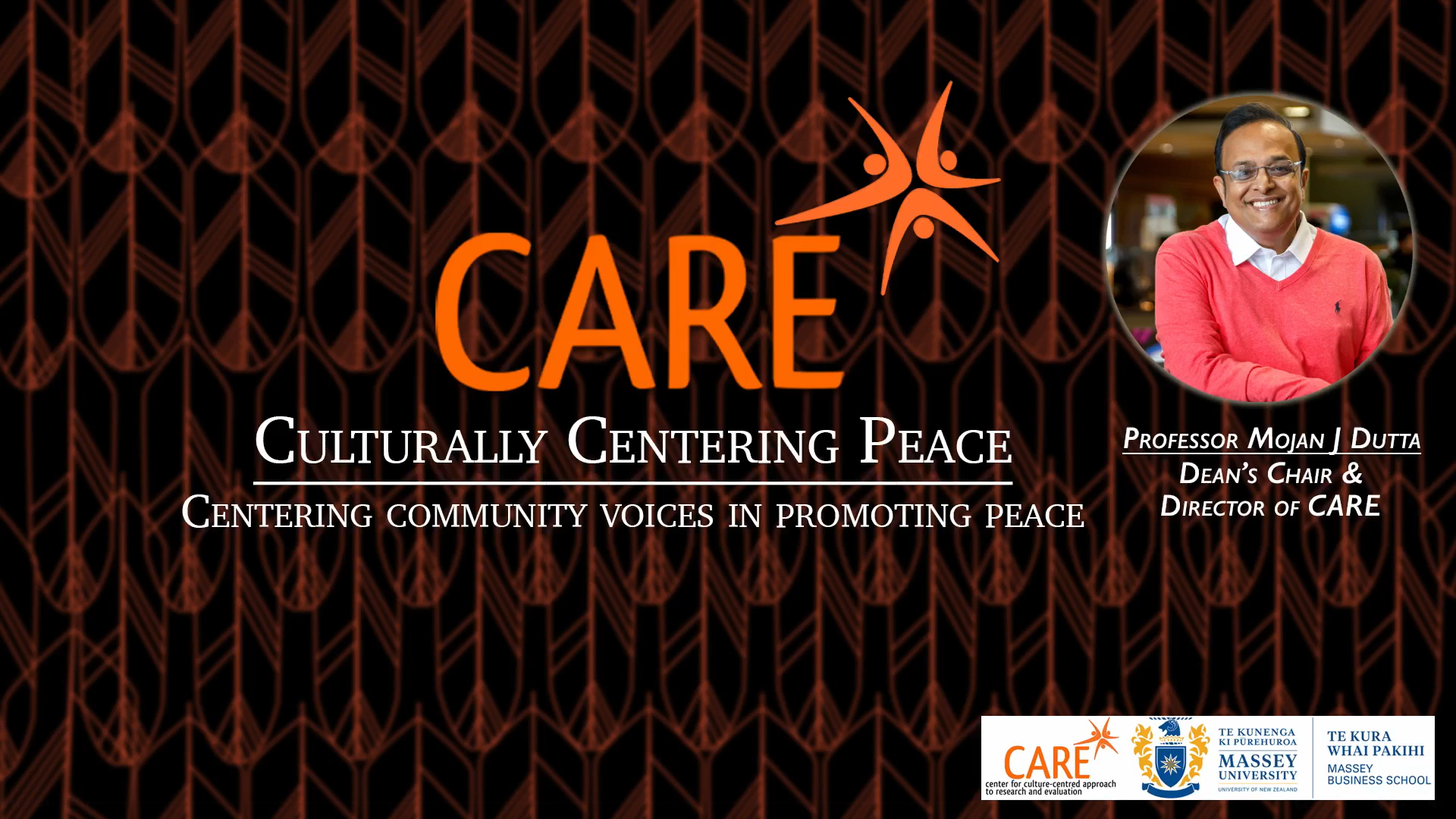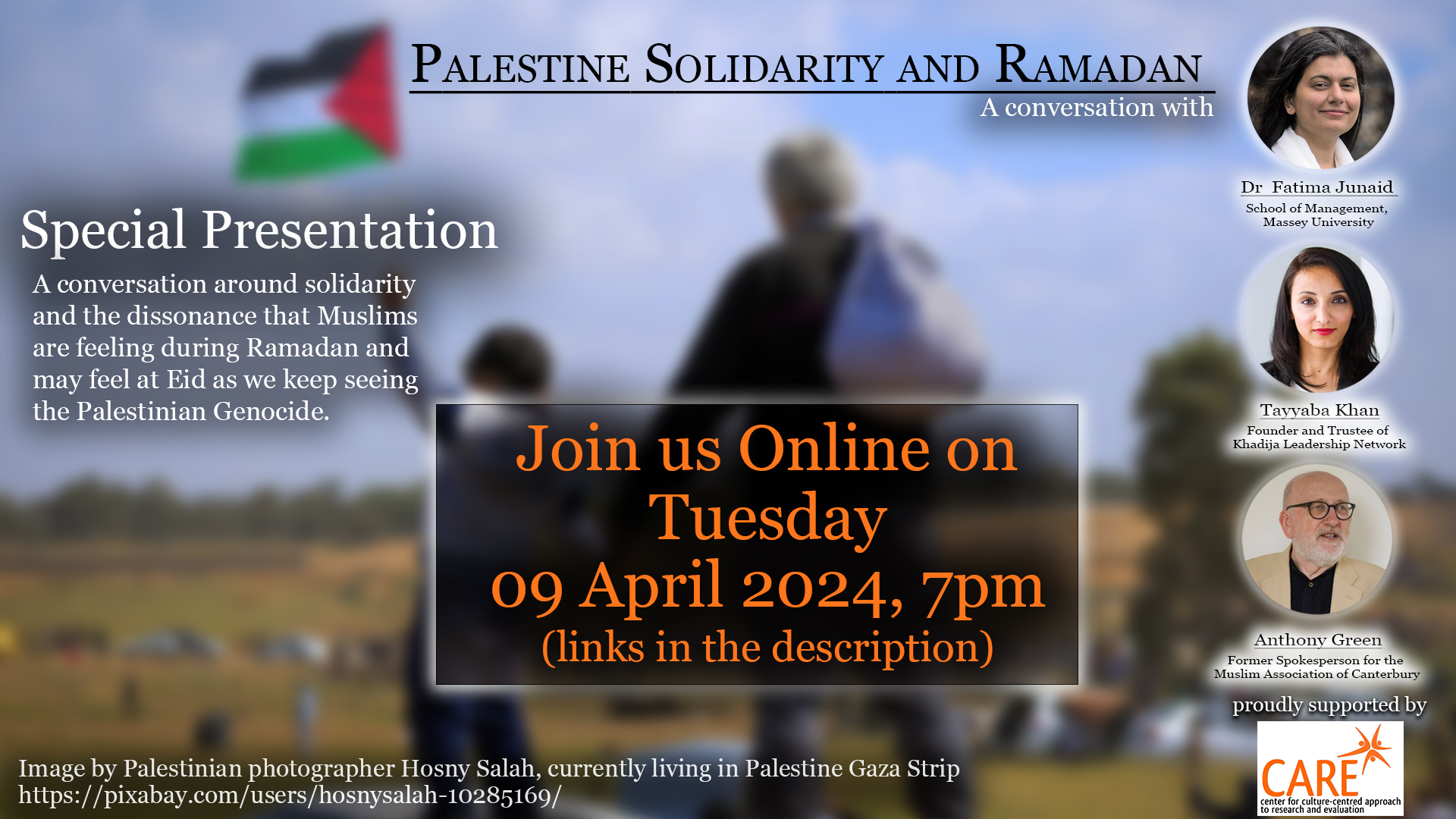This lecture offers a culture-centered approach to promoting peace


Center for Culture-Centered Approach to Research and Evaluation
This lecture offers a culture-centered approach to promoting peace

Professor Mohan Dutta reflects on the colonial divide and rule strategy that pits migrants against Māori, outlining the role of migrant-Maori solidarities in building an anti-racist Aotearoa.
Join us online on Tuesday 09 April 2024, 7pm for CARE’s Special Presentation on Palestine Solidarity and Ramadan with Dr. Fatima Junaid, Tayyaba Khan and Anthony Green.
A conversation around solidarity and the dissonance that Muslims are feeling during Ramadan and may feel at Eid as we keep seeing the Palestinian Genocide.
Supporting each other to keep going with the solidarity efforts and acknowledging that any effort is good as long as we are not silent. Please join us as we ponder on the question of what it means to have Eid in these times.

Livestream Links:
CARE Facebook Page:
https://www.facebook.com/events/957996199291968/
CARE YouTube Channel:
https://www.youtube.com/channel/UCF760E7rBst3U5GmJ5FhDDw
Reading:
Below is a document prepared by Anthony Green for the online talk supported by CARE – Center for Culture-Centered Approach to Research and Evaluation.
A selection of some different perspectives on the uses of language and on ways of seeing – a few examples of texts and sources that may be of interest.
Presenters:
Dr. Fatima Junaid is an experienced consultant and educator working within public and private sector for over a decade. Dr. Junaid has done extensive research with marginalized communities including refugees, women, migrants and fishers’ communities. She focuses on developing mechanisms of support for better wellbeing outcomes. Currently she is a Senior lecturer at Massey University and a member of the several wellbeing (academic and professional) organisations. She also runs a social media support network group for Pakistani women in academia.
Dr Junaid can be reached at f.junaid@massey.ac.nz or
https://www.linkedin.com/in/fatimajunaid1/
Founder and trustee of Khadija Leadership Network, the New Zealand (NZ) Peace Ambassador for the European Muslim League, former Director of Advocacy at the Office of the Health and Disability Commissioner, and a community development practitioner with over 15 years of experience having worked with the migrant and refugee communities in The Occupied Territories of Palestine, Australia, United Kingdom and New Zealand. Tayyaba currently sits on the governance board of Mixit & Belong Aotearoa. She is also a regular panellist on RNZ’s ‘The Panel’, and ‘The AM Show’.
Originally from the UK, he worked as a teacher of English and Literature, first in the UK and then, for eighteen years in Singapore. In the six months’ period after the mosque attacks, and again in the 2020 “anniversary,” he served as spokesperson for the Muslim Association of Canterbury
His writings include books commissioned by Muis (Majlis Ugama Islam Singapura, Singapore’s Islamic Council), dealing with all aspects of the development and work of that body: its history, mosque-building programme, Hajj organisation, and more. His own work includes a history of how people travelled by sea from Southeast Asia to journey to Mecca for the Hajj. His interest is in people’s stories, particularly of those who are “unsung” – what the poet Brian Patten called, “the loose change history spent without caring.”
Image by Palestinian photographer Hosny Salah, currently living in Palestine Gaza Strip
https://pixabay.com/users/hosnysalah-10285169/
CARE Twitter page:
Massey research paper on Hindutva leads to trolling, persecution and threats via NZ Herald
CARE: Center for Culture-Centered Approach to Research and Evaluation stands in solidarity with its research team members Richa Sharma, Balamohan Shingade, and others (Indigenous women and women of colour) not mentioned in this report for their courage in documenting extremist #Hindutva nationalism and in building culture-centered preventive interventions rooted in dialogue, peace, and voice.
Full article:
Richa Sharma was doing research on religious extremism in Aotearoa when she got a call from her mother. Her aunties and uncles, close family friends who have known her since she was born, were convinced she was a terrorist.
For a few months last year, Richa Sharma did not go out after dark, always making sure she had safe ways to get around for work and meetings.
The 18-year-old was interning at Care, a Massey University research centre that was copping online abuse for publishing a white paper about the far-right nationalist ideology known as Hindutva and its creeping presence in Aotearoa.
There were calls for centre director Professor Mohan Dutta to be sacked, even burned alive. Police said the trolls were overseas, but an Auckland-based Indian news site published a piece calling Dutta a “left-leaning bigot under the garb of an academician”, and part of “a gang of some smelly rats”.
The Hindu Council and Hindu Youth New Zealand chimed in with nearly identical statements, condemning the paper for “accusatory and unsubstantiated assertions” that made the Hindu community look bad. Hindu Youth said it was “outright Hindu hatred”.
Most of the vitriol was directed at Dutta but his team, some of them South Asian and female, were not spared. Their profiles were public on the Care website and social media pages.
“We had to watch our steps carefully,” said Sharma, now 19. “I really didn’t feel safe. We had a police file open.”
Shortly after, an auntie and uncle reached out to Sharma’s mother back home in Palmerston North. They were not related by blood but it was custom in the community to address close family friends as auntie and uncle.
Over tea, Sharma’s mother was told her daughter worked for an anti-Hindu outfit and was urged to intervene. Auntie and uncle were convinced Sharma was a “left-wing, radical terrorist”.
Another auntie sent text messages condemning the white paper, including a petition against Massey University to take it down.
Source: NZ Herald
#CAREMasseyNZ #MasseyUni #CARECCA #CultureCenteredApproach #Solidarity #Hindutva #Nationalism #Aotearoa #NewZealand